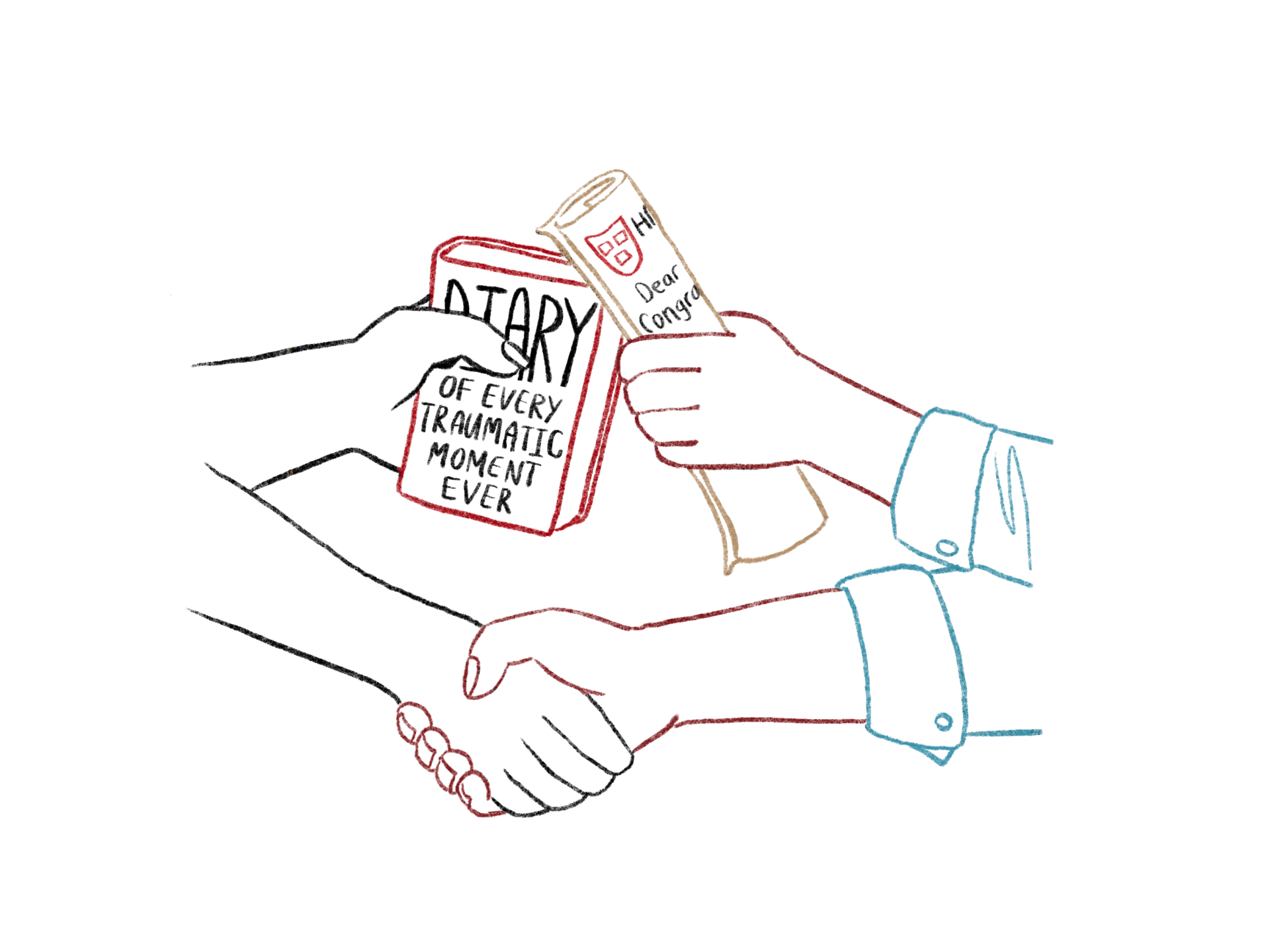Dr. Krupnick Interviewed by the Harvard Independent

The concept of students centering their college essays on their personal trauma has been dubbed “trauma dumping.” Viral social media stories have popularized this essay-writing approach, where trauma essays are portrayed as the “make-or-break” factor in college applications.
OCTOBER 5, 2023
Students should not be pressured to exploit their pain in college applications.
RANIA JONES | VISUALS: OLIVIA PARK 10.05.23: | UNEARTHED, FORUM
I am haunted by a lineage of four words: You are your trauma.
My mom died a week into my senior year of high school. As I approached and navigated the chaos of the college admissions process, my whole world was fractured. Between drafts and drafts of varying personal statements, everyone around me seemed to know that the gaping grief-sized hole in my life was what colleges were looking for. I was expected to capitalize on this.
The concept of students centering their college essays on their personal trauma has been dubbed “trauma dumping.” Viral social media stories have popularized this essay-writing approach, where trauma essays are portrayed as the “make-or-break” factor in college applications.
When students compare themselves to the other applicants, they rank themselves against their peers in a form of trauma Olympics. Turning one’s pain into a self-sales pitch should never be the way to win over an admissions officer. The personal essay could be meaningful for students if they actually felt that any topic was available to them—as I reflect on my own college application process, however, I’m left wondering, is capitalizing on and benefiting from personal trauma unethical? Or is it a “glass-half-full” way of looking at things?
Founder and CEO of the Krupnick Approach and current college consultant Dr. Joseph Krupnick ’00 said, “The fundamental goal for getting into top schools is to differentiate yourself, to distinguish yourself, and to create your own hook … People who have traumatic experiences or who have an uncharacteristic life, or other experiences, that are also unusual, feel pressure to write about those things, because they are very personal and unusual.”
The majority of college applications consist of test scores, GPAs, and class rankings—all factors that shrink our beings into data points. It’s no surprise that essays are often viewed as the only thing on a student’s application over which they feel they have control.
According to the College Board, colleges want “a unique perspective, strong writing, and an authentic voice,” from students in their application essay. Harvard Business Review says the Common App essay is “your chance to show schools who you are, what makes you tick, and why you stand out from the crowd.”
The college application process is “intrinsically an intrusive process,” according to Krupnick. “And it’s intrinsically a process in which you’re telling people things that they have no right to know about. It’s kind of how the system seems to work now,” he explained.
The college essay should be a space for exploration and reflection where students can present what they care about and what makes them who they are. Yet, when students feel required to write about their adversity to stand out, the college essay allows for minimal amounts of meaningful self-reflection. This phenomenon narrows what applicants think is worth writing about, and more problematically, what makes them worth receiving the education they dream of.
When a Harvard junior who wished to remain anonymous was asked if they felt a pressure to write about their eating disorder, they said, “I felt like I was able to write about it, from not a place of it being a sad story, but of actually about something pretty incredible that I was able to overcome.” They continued to explain that our society normalizes trauma in a problematic way, detailing that “people to try to compete with others” about their trauma.
Similarly, Abigail Mack ’25 went viral on TikTok after posting about her “Letter-S” essay about the loss of a parent. Stories like Mack’s contribute to the belief that in order to be a competitive college applicant, not only must students have endured trauma—they also must put it on display to be analyzed by admissions officers.
The Supreme Court’s decision to overturn race-based affirmative action puts an even harsher burden on applicants’ essays. Colleges no longer can consider the systems of inequity that may affect students of color, but individuals can include their experience as a marginalized person in the essay. Hopefully, future students undergoing college admissions will not feel as though they are at a disadvantage because they are competing with kids on the same academic level who have faced more adversity than them. No one should feel forced to disclose anything that they may have gone through. And students who do not feel they have experienced much adversity or hardship should be grateful, not bitter, and write about any of the other things that make them who they are.
Exploiting painful and traumatic moments in your life to “sell yourself” to a college will never work in your favor. An anonymous Harvard student shared a similar sentiment—“I think that like one of the things that my college counselor was like really trying to drive home was like ‘you can’t write a sob story, because they’re just going to read it and feel bad for you. Like there has to be, like a so-what, like what did it do to you, like why?’” she said.
Never in the process of writing my college essays did I ask myself if writing about my mother’s death would give me admission clout. I knew what I went through was terrible and to overcome those challenges was remarkable, but a little bit of me will always wonder if Harvard thought my trauma was all I had to offer. Is who I am outside of my trauma still enough for Harvard, or were they just looking for a slap on the back for saving me from my circumstances?
Trauma-induced people should lean on the conflicts of their life only in authentic ways. I wrote about the most intimate moments of my life only because I know that I am not defined by my grief. Instead, it has helped shape who I am. I would encourage those who feel like their stories were written in tragedy to rethink writing about their trauma. You don’t want to become an applicant that colleges pity, nor will people value more if they can only sympathize with you. The admissions officer will not be just focusing on what happened, but will take into consideration what’s happening next, or what’s happening now.
*Quotes have been adjusted to account for filler words and grammatical correctness.Rania Jones ’27 (rjones@college.harvard.edu) has shamelessly published her traumatic college essays for public reading.
FREE
COLLEGE WEBINAR PLANNING SERIES
With a FREE 30-Minute Consultation With One of Our Experts
Latest Updates

How to think About College Applications
If you are like most people, the prospect of making a choice about where to spend the next four..

Ace Your Exams with These General Study and Organizational Tips
Whether you’re preparing for the ACT and SAT®, graduate-level exams, or just looking to improve your academic performance..

College Super-Scoring, Test Optional Status & Admissions Data
Colleges and universities that “superscore” the ACT or SAT® will consider each applicant’s highest individual subject score from..

